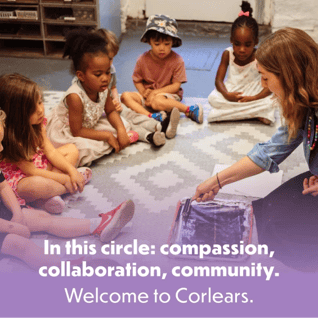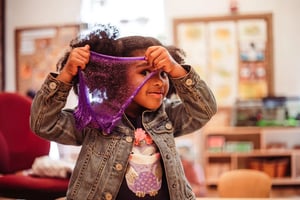
PreK
About
Corlears School provides PreK students with a strong start to their school journey in preparation for Kindergarten. Our PreK classrooms invite an emergent curriculum with integrated skill set work. Educators celebrate each individual child and what they bring to the community of learners, while also capturing student curiosity, prior knowledge, and cognitive skill sets rooted in and reflective of critical thinking. As children prepare for Kindergarten, educators partner with families to assess readiness through the lens of autonomy, agency and advocacy, all necessary skills to navigate the demands of a Kindergarten classroom.
Children must be 4 years old on or before September 1 to be eligible for a fall start.
If your child will be younger than 4 years old, check out our Nursery classrooms.
PreK classrooms follow a full-day school schedule from 8:30 to 3:00 p.m.
After-school is available via as an optional add-on from 3 p.m. to 6 p.m.
Corlears uses Ravenna to manage applications. Once you've created an account, submit your child's application; a $50 fee applies.
PreK classrooms average 15 students per room, led by a Head Teacher and supported by 1-2 Associate Teachers or Classroom Teaching Assistants.
All Head Teachers hold Master's degrees in early childhood or elementary education, in addition to role-specific certifications. Associate Teachers are often working towards a degree in Early Childhood Education. Our Classroom Teaching Assistants and Childcare team receive in-depth health & safety training every year; in addition to bringing years of experience working with very young children.
Program Overview
Language, literacy, math, art, and science are woven throughout classroom investigations, learning experiences, and small- and large-group activities. The environment — inside the classroom, in our backyard, and in the neighborhood — is considered the "third teacher" as a provocation for inquiry, furthered understandings, and hands-on explorations are offered as extensions on themes and threads of inquiry.
The children’s intellectual and social development is enhanced through active experiences, which prepare them for Kindergarten readiness as they engage in meaningful learning rooted in hypothesizing, questioning, exploring, and problem-solving at the intersection of play and wonderment.
Every Child Enrolled in PreK Will...
- Experience ownership and responsibility of their classroom environment by taking care of themselves, their belongings and actively helping others.
- Bring a sense of self, family and culture into the thriving community of active learners by sharing their family books, portraits, home stories, and explorations and expressions of their social-cultural and familial values, beliefs and considerations.
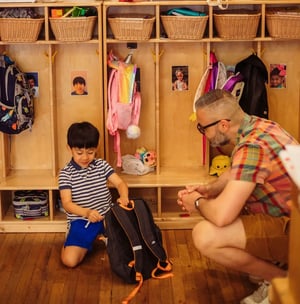
- Engage in social studies that encompass neighborhood walks and field trips that support and celebrate the larger, social world of shared experiences.
- Explore, examine, consider, and contemplate wonderings and curiosities related to pre-academic skill sets rooted in language and literacy, mathematical thought and thinking and scientific concepts as well as cross-cultural approaches to learning. These learning experiences are evident in studying the lifecycle and habitat of a beetle, map-making from a peripheral and bird's-eye view which supports perspective-taking both from a primary initial lens and also as a comparative differential viewpoint. In addition, home, land and neighborhood studies are also observable in the PreK classroom.
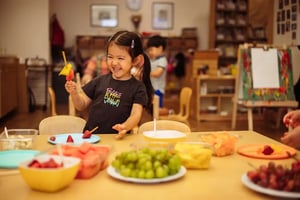
- Engage in expressing new understandings and appreciations in art, music and movement, while developing broader understandings rooted in cognition, perception and imagination.
- Form an appreciation of technology as a tool for connection and engagement, influence, and inspiration.
- Prepare for Kindergarten, ready to engage in an expansion of knowledge, relationships, and skills sets.
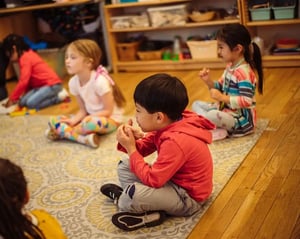
Aligned with New York State Standards
The early childhood educators at Corlears School foster growth in key developmental domains through sensory-rich activities, thoughtfully designed classroom stations, and child-led exploration. Aligned with New York State-recognized standards in early childhood development, the PreK curriculum promotes:Why Choose Seedlings at Corlears?
From the Blog
A Day in the Life at Camp Corlears: NYC Summer Camp for 3- and 4-Year-Olds
Differences Between Nursery School and Daycare: What to Consider
Corlears School Announces a Return to Its Early Childhood Roots

Connect with Admissions
Interested in enrolling your child at Corlears School? Submit an inquiry and a member of the admissions team will follow up as soon as possible. For any questions, email us at admissions@corlearsschool.org. We look forward to getting to know your family!
